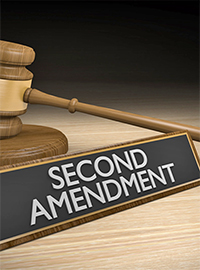| Individual States Can Reinforce 2nd Amendment Rights |
 |
|
By Timothy H. Lee
Thursday, February 01 2018 |
Amendment II A well regulated Militia, being necessary to the security of a free State, the right of the people to keep and bear Arms, shall not be infringed. You'd assume that the explicit terms of the Second Amendment would resolve any debate over the individual right to keep and bear arms. All too often throughout American history, however, that hasn't been the case. After all, it took over two centuries of jurisprudence for the U.S. Supreme Court to finally confirm in D.C. v. Heller (2008) what the Founding Fathers considered a given: The Second Amendment confers an individual, not collective, right to keep and bear arms. And then it took two more years for the Court to confirm in McDonald v. Chicago (2010) that the right is protected against infringement by state and local governments, not just the federal government. So progress concerning a right so fundamental that the Founders deliberately placed it high among the list of original amendments has been painstaking. Part of the problem sprouts from restrictionists' mischaracterization of the term "militia." Under their rationalization, that prefatory term refers to some sort of organized state military bureaucracy. But that's demonstrably inaccurate. As used and defined in statutes of the period, the term "militia" referred to all able-bodied men within the applicable jurisdiction, not some sort of formal military organization. Even more fundamentally, the Second Amendment deliberately refers to a right of "the people." That term is used repeatedly throughout the Constitution and its amendments, and in every single case it protects an individual right, not some sort of collective governmental right. Regardless, the Second Amendment stands peculiar in the degree to which securing its protections has remained difficult. Fortunately, the federal government isn't the only level at which Americans' individual right to keep and bear arms can be secured. Although the Constitution and federal laws create a floor of protection for individual freedoms such as the Second Amendment, they do not create a ceiling. State and local governments can protect individual liberties to a higher degree than the Constitution and federal laws require. And that is precisely what continues to occur across the nation. For example, as recently as the 1980s, fewer than ten states maintained concealed carry firearms laws. Today, that number is fifty, even if isolated states like Illinois merely pay lip service to the right. And in the wake of the Heller and McDonald decisions, even those states' ability to pay nothing more than lip service stands greatly diminished. As another example, legislatures and activists in multiple jurisdictions seek to preserve the explicit individual right to keep and bear arms in state constitutions that don't already include them. Such efforts also seek to require that courts employ what's known as "strict scrutiny" when adjudicating any law or regulation that restricts the right to keep and bear arms. For anyone unfamiliar, "strict scrutiny" essentially means the most exacting analysis that a court can apply to a law. It demands that the law in question seeks to achieve a compelling government goal in the least restrictive way possible. In contrast, less exacting tests such as intermediate scrutiny grant governments far more leeway in imposing laws or regulations that restrict citizens' freedoms. Only the most treasured rights, such as freedom of speech, freedom of religion and protection against racial discrimination currently require "strict scrutiny." These state-level initiatives would add the individual right to keep and bear arms to that pantheon of rights. In Iowa, as one example, House Joint Resolution 13 would finally place the individual right to keep and bear arms within the text of the state's constitution. The law would also make Iowa the fourth state - alongside Alabama, Louisiana and Missouri - to specifically impose the "strict scrutiny" adjudication standard in any case addressing that right. None of this, of course, reduces our duty to protect Second Amendment rights at the federal level. Today, restrictionists seek to overturn the Heller decision via amendment, statute and appointment of judges who would reverse it. Accordingly, the duty to support candidates who promise to protect Second Amendment rights and confirm judges in the line of the late Justice Antonin Scalia or his replacement Justice Neil Gorsuch remains paramount. But the ability to protect the individual right to keep and bear arms at the state and local levels offers an additional bulwark against efforts to restrict or eliminate that right. The stakes are too high to forego any opportunity to galvanize Second Amendment protections, wherever those opportunities happen to exist. |
Related Articles : |
























